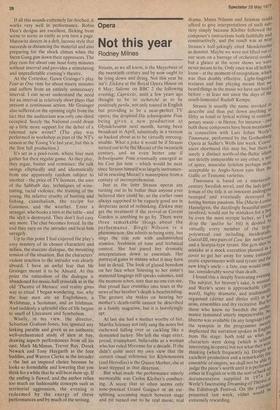Opera
Not this year
Rodney Milnes
Strauss, as we all know, is the Meyerbeer.of the twentieth century and by now ought to be lying down and dying. Not this year he isn't: Elektra at the Royal Opera House on 6 May; Salome on BBC 2 the following evening; Capriccio, until a few years ago thought to be so recherché as to be positively perdu, not only toured in English but providing to be a near-perfect TV opera; the despised Die schweigsame Frau being given a, new production at Glyndebourne next month, having been broadcast in April, admittedly in a version so hacked about as to be virtually unrecognisable. What a...joke it would be if Strauss turned out to be the Mozart of the twentieth century, and an even better one if Schweigsame Frau eventually emerged as his Cost fan tutte — which would be neat since Strauss himself was largely instrumental in rescuing Mozart's masterpiece from a century of incomprehension.
Just as the later .Strauss operas are turning out to be better than anyone ever believed they could be, so the earlier ones always supposed to be vaguely good are in desperate need of rethinking. Elektra may get the treatment if the revival at Covent Garden is anything to go by. There were three remarkable things about the performance. Birgit Nilsson is a phenomenon. She admits to being sixty, but sings the title role with undiminished stamina, freshness of tone and technical control. •She has pared her dramatic interpretation down to essentials. Her portrayal gains in stature what it may have lost in detail. The look of glazed boredom on her face when listening to her sister's maternal longings still speaks volumes, and the moment when, sure that no one can see, that proud face crumbles into tears at the news of her brother's death is heartrending. The gesture she makes on hearing her mother's death-rattle 'cannot be described in a family magazine, but it is horrifyingly apt.
At last she had a mother worthy of her. Martha Szirmay not only sang the notes but eschewed falling over or cackling like a demented turkey. She left the stage erect, proud, triumphant, believable as a woman who has ruled Mycenae for a decade. If she 'didn't quite meet my own view that the correct visual reference for Klytemnestra (and Herodias) is the Queen Mother, she at least stepped in that direction.
But what made the performance utterly memorable was Carlos Kleiber's conducting. A score that so often seems only tone-poetical Grand Guignol or an earsplitting screaming match between stage and pit turned out to be real music, real
drama. Mmes Nilsson and Szirmay could afford to give interpretations of such subtlety simply because Kleiber followed the composer's instructions both faithfully and constructively, and the result was as near Strauss's half-jokingly cited Mendelssohn as dammit. Maybe we were not lifted out of our seats on a barrage of orchestral sound, but a glance at the score shows we were never meant to be. Only once was all hell let loose — at the moment of recognition, which was thus doubly effective. Light-fingered textures and fine playing meant that We heard things in the music we have not heard before — at least not since the days of the much-lamented Rudolf Kempe.
Strauss is usually the name invoked to describe and thus put down anything 0 filthy as tonal or lyrical writing in contenv porary music — in Henze, for instance — and., both these composers have been mentioneu in connection with Lars Johan Werle's Tintomara, performed by the Gothenburg Opera at Sadler's Wells last week. Conve' nient shorthand this may be, but there is surely a distinct north-of-the-Baltic idiora not strictly comparable to any other, a OE of spare, muscular lyricism perhaps trore acceptable to Anglo-Saxon ears than die Gallic or Teutonic varieties. Tintomara is based on a nineteenth" century Swedish novel, and the lady/gerltleman of the title is an innocent androgYae besieged and eventually destroyed hY boring human passions. She (Marie-Louise Hasselgren, the dazzlingly beautiful meiz° involved, would not be mistaken for a h°,71 by even the most myopic lecher, so I WI' drop the 'and/or he' bit) is desired bY virtually every member of the large' polysexual cast including, incidentallY Gustaf III, two pairs of Cost fan tuttelovers and a Scarpia-type tyrant. She gets shot bY mistake at a mock execution planned as 3,4 cover to get her away for some enforeeeu erotic experiments with said tyrant and th e new king's uncle — a fate, one would itrag ine, considerably worse than death. I found this a deeply frustrating everliti! The subject, for heaven's sake, is unas","t,' and Werle's score is approachable (d'r,/, word), highly dramatic, and traditioPalei't organised (dirtier and dirtier still) la fs r arias, ensembles and dry recitative. Butc°1., those who knew no Swedish the Polio mance remained utterly impenetrable. to libretto was available (in any language) 3 ly the synopsis in the programme Meriesh duplicated the narration spoken in EaPtihe from the stage: both told us what,A001 characters were doing (which is seiu,..re interesting in opera) but not what they W'tto thinking (which frequently is). Despiter,fle excellent production and a remarkablY "to ensemble of singers, we shall not be ahl!ecl judge the piece's worth until it is perforrea either in English or with the sort of ba: for documentation supplied in 197', e Werle's fascinating Dreaming of Mires ce vide° the Edinburgh Festival. On the e td be presented last week, either wow
extremely rewarding.


































 Previous page
Previous page